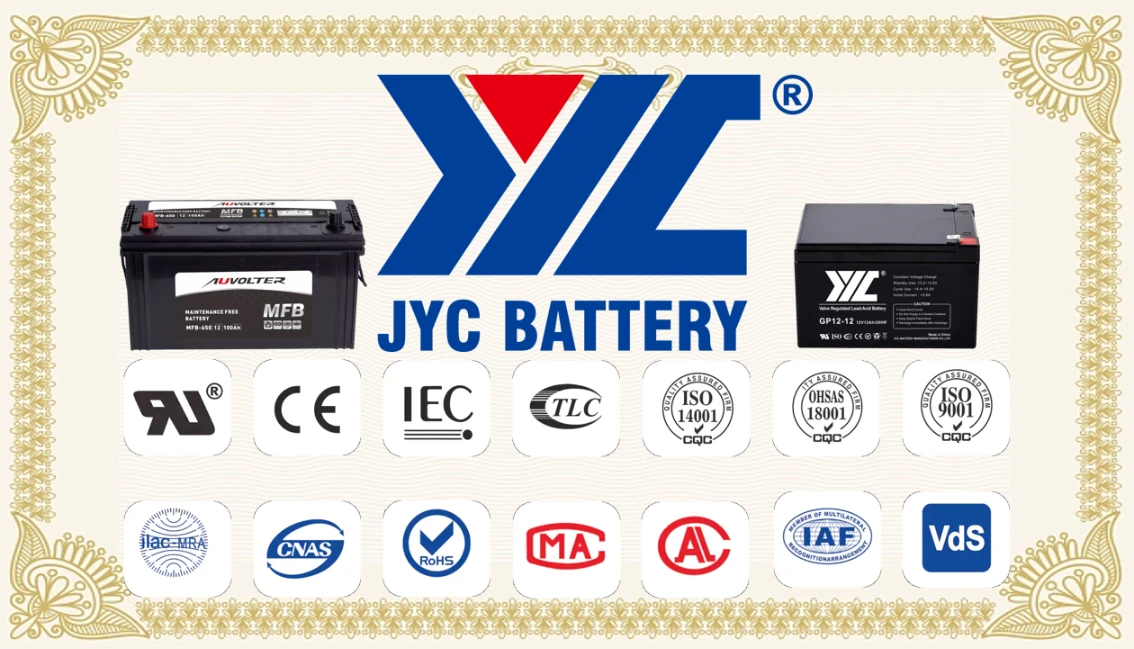
Lead-acid batteries have long been a part of powering a number of applications, such as automobiles and backup power systems. With these batteries remaining an integral part of both consumer and industrial environments, it becomes paramount to ensure their safety and reliability. This article discusses critical certification requirements that lead-acid batteries must uphold in order to guarantee safe and efficacious operation.
Introduction to safety certifications
As far as lead-acid battery safety is concerned, keeping the foremost concern in mind, several key safety certifications are giving both the manufacturers and consumers an assurance that these batteries have been subjected to rigorous testing so as to conform with stringent safety standards. The prominent safety certifications include:
1. UL Certification
Underwriters Laboratories (UL) certification commands much respectability and recognition. It ensures that lead-acid batteries conform to rigorous safety standards, besides having undergone thorough testing for issues such as fire resistance, chemical leakage prevention, and electrical performance.
2. CE Certification
The Conformité Européene (CE) marking identifies those lead-acid batteries which conform to the safety requirement, health and environmental protection laid down in European legislation.
3. IEC/EN 62133 Standards
The International Electrotechnical Commission (IEC), with IEN 62133 standards, deals with safe transport, handling and use of portable sealed secondary cells as well as batteries that contain anything other than acid electrolytes. The tests done under these particular standards cover enough facets on the level of adequacy of lead-acid batteries.
4. ROHS Compliance
Lead-acid batteries are restricted to comply with the Restriction of Hazardous Substances (ROHS). This certification restricts the use of certain hazardous materials in a manufacturing process, thus ensuring that both the end users and the environment remain safe.
5. FCC Certification
Federal Communications Commission (FCC) requires a certification for lead-acid batteries with wireless communication capabilities. The certification ensures that the wireless functions present within a battery do not cause electromagnetic interference with other electronic devices.
6. IATF 16949 Certification
The quality management systems in the International Automotive Task Force (IATF) 16949 correspond to the field of the automotive industry. It focuses on quality management systems that ensure lead-acid batteries used in vehicles conform with safety and rigorous safety quality set by the automobile industry.
Ensure Battery Designs Meet Safety Criteria
Safety certifications do not emanate from formalities only. They culminate in comprehensive testing and evaluations. Manufacturers, therefore, ought to make their lead-acid battery designs obey safety criteria to increase consumer and industrial confidence regarding their goods.
Battery designs should consider the following:
1. Chemical Containment: Leakage control, besides controlling the release of potentially hazardous chemicals, cropping up high in the agenda, protects the environment, thus reducing environmental contamination and protecting end-users.
2. Thermal Management: Good heat dissipation will avoid overheating, thus reducing fire and explosion risks. Stabilizing battery performance is a major means by way of temperature effects.
3. Mechanical Integrity: The design must be able to withstand physical stresses as well as vibrations without sacrificing safety 101. It becomes critical for applications such as transportation and industrial equipment.
4. Electrical Performance: Consistent, reliable electrical output is key for lead-acid battery applications where electrical power is required.
The Takeaway
Above all other technologies, lead-acid batteries take a prominent role in the sources of power across industries. Nevertheless, their safe and effective operation hinges on complying with stringent certification requirements. UL, CE, IEC, ROHS, FCC, and IATF certifications create the credibility as well as reliability of lead-acid batteries together. The user and manufacturer can both trust that these batteries are tested very rigorously to meet the safety standards at their highest levels. Only then does the industry continue to provide power solutions that are both efficient yet also safe for consumers and the environment.
All our JYC batteries possess all kinds of certifications, so worry not and get your desired battery now.



